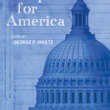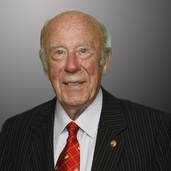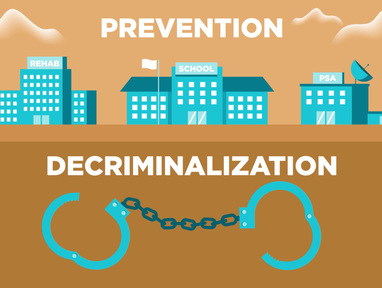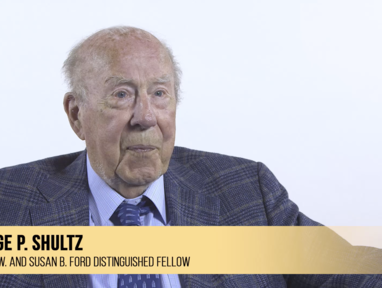One Hundred Years of George Shultz
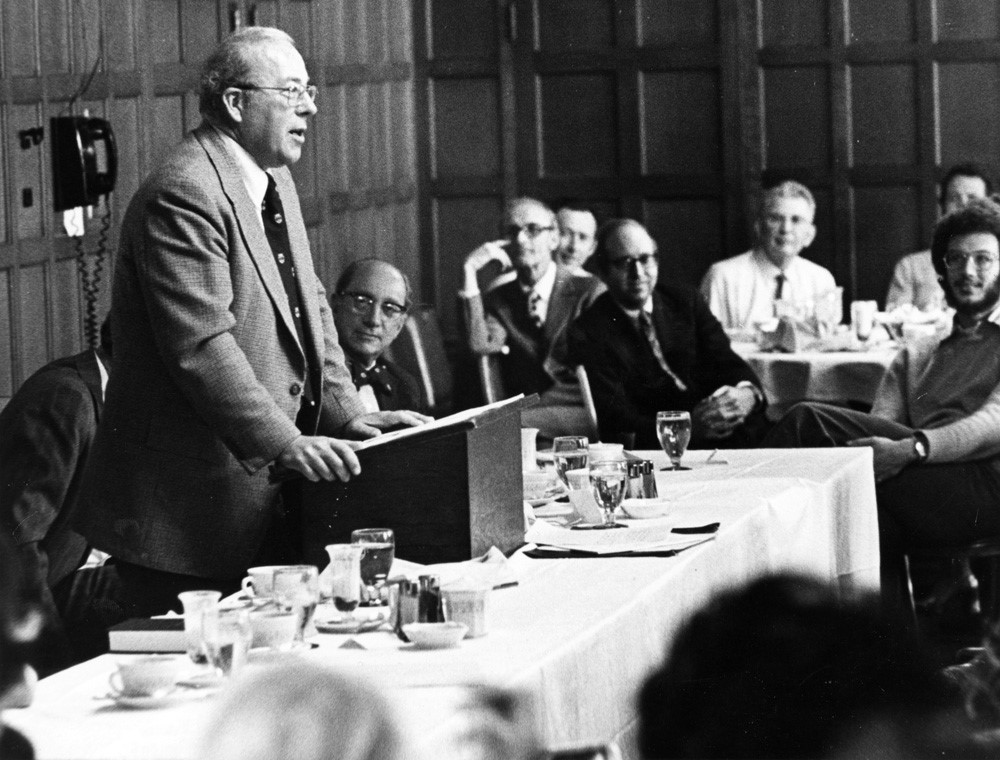
Over the past century, George P. Shultz has made an immeasurable mark on the world. He is one of only two individuals in American history to have held four different federal cabinet posts. He taught at three of the country’s finest universities, and for eight years he was president of a major engineering and construction company. With such a distinguished career in academia, business, and government, Shultz has lived through some of the greatest events in history and shared his knowledge with countless individuals.
In this special edition of Policy Insights, we take a look at one hundred years of wisdom from economist, businessman, and dedicated public servant George P. Shultz.
What can we learn from the past?
At one hundred years old, George Shultz is no stranger to perspective. Throughout his long life he has witnessed tumultuous changes, so he recognizes the importance of long-term thinking. In the closing note of Blueprint for America, which he edited, Shultz explains why thinking in the short term won’t help us solve our problems:
Our government continues to suffer from a lack of long-term thinking. It is hard to keep working at our most important priorities in a sincere way if we do not have a basic vision to support that. Our energies and attention get drawn up into the next crisis served up atop the political agenda. Instead, the political environment should make room for competent individuals to work in good faith toward matters that will be good for the country, even if they do not offer immediate rewards.
Much has changed over the last one hundred years, but some things aren’t as different as we may think. For example, the goals of government have remained largely the same over the past century. From managing governmental spending to maintaining global alliances, America’s top priorities remain constant. But these priorities will not be met on their own. Good governance is essential to meeting the goals of the country. Based on the work of George Shultz, the video below explains how good governance will help us sustain our long-term goals.
How do we approach national security?
As Ronald Reagan’s secretary of state, Shultz played an essential role in the nation’s foreign policy near the end of the Cold War. Shultz’s guiding principle in foreign policy relations was trust. In this essay from Shultz’s book Learning from Experience, Shultz explains that trustworthiness depends on delivering on one’s promises, and that includes avoiding empty threats. In foreign policy, making empty threats has real consequences.
Throughout history, many bad actors have taken advantage of empty threats. Europe issued empty threats to Hitler as he remilitarized Germany. Saddam Hussein faced empty threats from the United Nations as he terrorized his people. Our adversaries see through empty threats, and millions pay the price. The video below expands on these dangers.
Strength and diplomacy don’t happen without credibility. To build trust among our allies, we must follow through on what we we’ll say do. Empty threats are dangerous to national security, as they lead to the loss of influence, authority, and integrity. By establishing trust and credibility among out enemies and our allies, we can deter bad actors.
Deterrence is an important aspect of American foreign policy. Through it, there is opportunity to achieve our goals peacefully. But deterrence only works if we are capable of acting, mean what we say, and communicate clearly. If we are not willing to act on what we say, our allies and enemies will no longer believe us and we will lose our hard-earned credibility. Based on the work of George Shultz, the video below explains the difficult but crucial task of deterrence.
By establishing its credibility, the United States is better able to achieve its foreign policy goals. This is not just an abstract idea. As secretary of state, George Shultz helped enact foreign policy that led to the end of the Cold War. Navigating such delicate foreign policy began with trust. In Hoover’s Virtual Policy Briefing “Learning from Experience,” George Shultz reflects on a pivotal moment in Soviet relations. After successfully negotiating the release of a family of persecuted Pentecostals who had taken up residence in the US embassy in the Soviet Union, Shultz recalls:
There are two elements of trust that came out of that. One was [Ronald Raegan] saw that you could make a deal with the Soviets and they would carry it out. They saw the same thing. They knew how tempting it is for an American politician to say “Look what I did!” He said he wouldn’t do it, and he didn’t. You can trust him. And in all these things I think something to remember is trust is the coin of the realm. As you are trying to do things, develop trust.
How do we address climate change?
One of the biggest dangers facing the world today is climate change. In “America and Strategies for the Future” Shultz asserts that climate change is an issue that requires immediate global reaction in order to prevent further damage. Though scientists are working tirelessly to address climate change, it will take more than the scientific community to find solutions.
The first step toward a cleaner environment is reducing emissions. Although US energy use plateaued from 2007 to 2013, the nation must make further efforts to limit its carbon emissions. George Shultz, Jeremy Carl, and David Fedor write about these challenges in the introduction to The State Clean Energy Cookbook: A Dozen Recipes for State Action on Energy Efficiency and Renewable Energy:
The steep drop in US natural gas prices since 2008, while beneficial to the economy as a whole, has reduced the cost competitiveness of renewables and dampened the incentive for cutting energy use. At the same time, policy support from Washington has been inconsistent, with on-again, off-again clean energy incentives, steep declines in support for renewable energy from the federal loan guarantee program, and unreliable R&D funding.
Currently, the United States uses a complicated series of emissions rules, costly subsidies, and ad hoc mandates to regulate carbon emissions. One option, revenue neutral carbon taxes, could reduce carbon pollution at a lower cost and with fewer restrictions. Unlike current policies, carbon taxes are economically efficient because they make people pay directly for the costs they create. A revenue-neutral carbon tax would encourage consumers and producers to shift toward energy sources that emit less carbon. Based on the work of George Shultz, the video below further explains the benefits of carbon taxes.
The second step toward a cleaner environment is turning to more efficient energy use. The good news is that we are already on the right track. Between 2008 and 2013, the United States doubled its production of non-hydro-renewable power production. In the introduction to the Reinventing Nuclear Power essay series, George Shultz and Admiral James O. Ellis Jr. explain:
Wind and solar power dot the landscape, driven by supporting policy but also by continuous advances in technological performance, manufacturing, and business strategy. They have evolved from science experiments to now justifying their own roles on our changing electric grids. Meanwhile, rethinking how we use our energy, from LED lighting to low-heat-loss windows, has dramatically improved efficiency and disrupted the curve on national electricity demand.
But wind, solar, and hydroelectric power are not the only sources of clean energy. As the world continues to shift toward low-carbon energy sources, it is clear that nuclear power has to be included in order to reduce carbon emissions. Whereas a rainy day might dampen the effectiveness of solar power, and an unusually still day might thwart a wind turbine, nuclear power is reliable rain or shine. Based on the essay “The Benefits of Nuclear Power” by George Shultz and Admiral James O. Ellis Jr., the video below explains why we cannot take nuclear power off the table if we truly wish to reduce carbon emissions:
Despite the obvious benefits of nuclear power, many are deterred from such an energy source after catastrophes like Chernobyl. While there may be some risk to nuclear power plants, the benefits far outweigh any adverse consequences. Shultz explains:
Radioactivity is a cultural and emotional concern for many people, but nuclear power produces a relatively small amount of such waste—at a predictable rate, with known characteristics, and with $30 billion in disposal costs already paid for. Perhaps surprisingly, nuclear power production actually releases one hundred times less radiation into the surrounding environment than does coal power. Overall, with a long track record, the rate of human injury caused by nuclear power production is the lowest of any power generation technology, including renewable resources.
Conclusion
Throughout the course of his one-hundred-year life, George Shultz witnessed countless historical events. Even with all this experience, Shultz writes, “The world is on the hinge of history. The future is going to be different from the past in major ways.”
Navigating the future doesn’t have to be a mystery. As we traverse coming changes at home and abroad, it is important to adhere to common principles that help us chart a good course. In his essay for the Human Prosperity Project, Shultz lays out these principles:
Though the institutions and techniques to deliver them may change, the core approaches today are no different from the ones that animated Acheson and Marshall and Truman after the war: personal liberty, ensured through a just and responsive government (and realized through good individual educational foundations), and the market price system, which is really just a way of enabling personal choice and initiative, within a feedback loop, for social benefit.
With the knowledge imparted to us by such a monumental figure, we can press forward with hope. But knowledge alone is not enough. George Shultz has shown that he is also a man of action, and he encourages us to be the same. He says:
In my experience in public office, opportunities come and go. You never know when they may come. And if you’re ready, if you have ideas, then when the opportunity comes, you have the chance to move ahead and do something about it.
Happy one-hundredth birthday to George Shultz, and may his wisdom continue for centuries to come.

